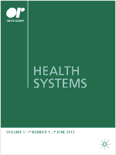
Health Systems
Scope & Guideline
Navigating the complexities of health innovation.
Introduction
Aims and Scopes
- Systems Thinking in Healthcare:
The journal emphasizes the application of systems thinking principles to understand and address complex healthcare challenges, promoting holistic approaches to health system design and management. - Operational Research and Simulation Methods:
A core focus is on the use of operational research techniques, including simulation modeling, to optimize healthcare processes, resource allocation, and decision-making under uncertainty. - Quality Improvement and Performance Management:
The journal addresses issues related to quality improvement frameworks and performance management systems in healthcare, aiming to enhance service delivery and patient care. - Health Technology and Data Analytics:
There is a significant interest in health informatics, including the use of data analytics, machine learning, and digital health technologies to improve health outcomes and operational efficiencies. - Interdisciplinary Approaches to Health Services:
The journal encourages interdisciplinary research that combines insights from various fields, such as economics, sociology, and engineering, to address health system challenges.
Trending and Emerging
- Resilience and Crisis Management in Healthcare:
A growing focus on resilience in healthcare systems, particularly in the context of disruptions like the COVID-19 pandemic, emphasizes the need for robust strategies to manage crises and ensure continuity of care. - Data-Driven Decision Making and Analytics:
There is an increasing emphasis on data-driven approaches, including machine learning and predictive analytics, to inform healthcare decision-making and improve operational efficiencies. - Interconnectedness of Health Systems:
Research is increasingly exploring the interconnected nature of health systems, considering how various components interact and influence one another, which is crucial for understanding health outcomes. - Patient-Centric Approaches and Personalization:
Emerging themes highlight the importance of patient-centered care and the personalization of health services, with a focus on tailoring interventions to meet individual patient needs. - Sustainability and Performance Management:
There is a notable trend towards integrating sustainability into health systems research, addressing the need for sustainable practices and performance management frameworks that consider long-term health outcomes.
Declining or Waning
- Traditional Healthcare Models:
There is a noticeable decline in research focused on traditional, linear models of healthcare delivery. This may indicate a shift towards more dynamic and adaptive systems approaches that better reflect current healthcare complexities. - Standalone Quality Improvement Initiatives:
Research centered solely on isolated quality improvement initiatives without a systems perspective is diminishing, suggesting a growing recognition of the need for integrated approaches that consider the entire healthcare ecosystem. - Generalized Health Economics Studies:
The journal has seen a reduction in generic health economics studies that do not incorporate systems thinking. This may reflect a trend towards more specialized or context-specific economic analyses that consider the nuances of different health systems.
Similar Journals
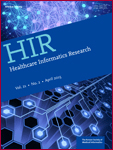
Healthcare Informatics Research
Elevating healthcare systems with cutting-edge research.Healthcare Informatics Research, published by the Korean Society of Medical Informatics, is a leading open access journal that has been advancing the field of healthcare informatics since its inception in 2010. With an ISSN of 2093-3681 and E-ISSN of 2093-369X, the journal provides a vital platform for disseminating high-quality research aimed at improving healthcare systems through innovative informatics solutions. Recognized for its contributions, it holds a Q2 rank in Biomedical Engineering and Q3 rankings in both Health Informatics and Health Information Management for 2023, reflecting its stature within the academic community. The journal is committed to open access, ensuring that research is freely accessible to researchers, professionals, and students worldwide, thus promoting knowledge sharing and collaboration. Located in the dynamic city of Seoul, South Korea, the journal serves as a hub for groundbreaking studies that impact health systems globally, making it an essential resource for those at the forefront of healthcare technology and management.

International Journal of E-Health and Medical Communications
Navigating the future of healthcare with e-health insights.Welcome to the International Journal of E-Health and Medical Communications, a pivotal publication designed to bridge the gap between health informatics and computer science applications. Published by IGI Global, this journal serves as a platform for innovative research and insights into e-health technologies, health communication strategies, and the evolving role of digital tools in enhancing healthcare delivery and management. With an ISSN of 1947-315X and E-ISSN 1947-3168, it caters to an audience keen on advancing the intersection of technology and health, as evidenced by its respectable standings in Scopus rankings—positioned in the 64th percentile in Health Informatics and 63rd in Computer Science Applications. Over its publication history from 2010 to 2024, the journal has consistently contributed to significant discussions and advancements within these fields, highlighted by its Q3 quartile ranking in 2023. Join a community of researchers, professionals, and students dedicated to the ongoing exploration of e-health, as we collectively navigate the complex landscape of healthcare innovation.

Family Medicine and Community Health
Driving change in healthcare through rigorous research.Family Medicine and Community Health, published by the BMJ PUBLISHING GROUP, is a leading journal dedicated to advancing research and practice in the fields of family medicine and public health. With an impact factor placing it in the Q1 quartile for both Family Practice and Public Health, this journal is indispensable for researchers, clinicians, and policymakers aiming to shape healthcare practices effectively. Since becoming Open Access in 2013, it has prioritized the dissemination of high-quality, peer-reviewed articles to a global audience, ensuring that knowledge is accessible to all. The journal’s rigorous selection process has established its reputation, reflected in its exceptional Scopus rankings—ranked #3 out of 56 in Family Practice and #42 out of 665 in Public Health. By fostering dialogue among healthcare professionals and academic researchers, Family Medicine and Community Health plays a critical role in addressing contemporary health challenges and promoting community-oriented healthcare solutions.
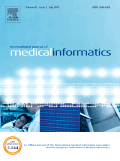
INTERNATIONAL JOURNAL OF MEDICAL INFORMATICS
Integrating Knowledge for Enhanced Medical PracticesInternational Journal of Medical Informatics, published by Elsevier Ireland Ltd, is a premier peer-reviewed journal dedicated to advancing the field of health informatics. Established in 1997, this journal has consistently strived to disseminate high-quality research and innovative practices, now recognized in the Q1 quartile of health informatics for 2023, ranking impressively at #24 out of 138 in Scopus. The journal's focus encompasses the integration of computer science and information technology in healthcare, fostering discussions on data management, telemedicine, health information systems, and decision support mechanisms. With an ISSN of 1386-5056 and E-ISSN of 1872-8243, it provides options for both subscription and open access, ensuring broad dissemination of research findings. As a vital resource for researchers, professionals, and students in the rapidly evolving domain of medical informatics, the International Journal of Medical Informatics is positioned to be at the forefront of knowledge translation in the health sector, contributing significantly to improvements in patient care and healthcare delivery.

INFORMATION RESEARCH-AN INTERNATIONAL ELECTRONIC JOURNAL
Advancing Knowledge in Library and Information Sciences.INFORMATION RESEARCH - AN INTERNATIONAL ELECTRONIC JOURNAL is a distinguished open-access journal published by the University of Sheffield's Department of Information Studies, situated in England. Since its inception in 1995, the journal has been at the forefront of disseminating research findings in the field of Library and Information Sciences, earning a commendable Q2 ranking in the category for 2023. With an ISSN of 1368-1613 and an E-ISSN of 1368-1613, it serves as a vital resource for scholars, practitioners, and students alike, providing a platform for innovative insights and engaging discussions. The journal accepts submissions from diverse perspectives related to the information research domain and contributes to the ongoing dialogue among academic professionals worldwide. With a Scopus ranking placing it at 150 out of 280 in its field, this publication underscores its importance in shaping the future of information studies while enabling wide accessibility to cutting-edge research.
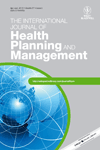
INTERNATIONAL JOURNAL OF HEALTH PLANNING AND MANAGEMENT
Transforming health planning into actionable strategies.INTERNATIONAL JOURNAL OF HEALTH PLANNING AND MANAGEMENT is an esteemed publication within the fields of Health Policy and Medicine, published by WILEY, a renowned academic publisher based in the United Kingdom. Since its inception in 1985, this journal has been at the forefront of advancing knowledge and practice in health planning and management, drawing on a diverse range of empirical and theoretical research to inform policy and improve health outcomes. With an impressive impact factor and ranked in the top quartile for both health policy and miscellaneous medicine, the journal is committed to publishing high-quality research that meets the needs of practitioners, policymakers, and scholars alike. Currently, it operates without open access, ensuring that all published articles maintain a rigorous standard of peer review while providing an essential platform for dialogue among professionals in the field. The INTERNATIONAL JOURNAL OF HEALTH PLANNING AND MANAGEMENT continues to play a vital role in shaping health systems and policies, making it an indispensable resource for anyone involved in health research and management.
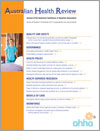
Australian Health Review
Transforming Challenges into Health SolutionsAustralian Health Review is a prestigious peer-reviewed journal published by CSIRO PUBLISHING, focusing on the dynamic field of health policy. Established in 1980, this journal has continuously evolved to address contemporary health challenges in Australia and beyond, showcasing research that informs policy decisions and enhances health care delivery. With an impressive Q2 ranking in the sector of Health Policy and a Scopus rank of #162 out of 310, it holds a significant position in the academic community, offering vital insights to researchers, practitioners, and educators alike. Although not an open-access journal, it provides valuable research contributions that advance the discourse in health policy and practice. Located at UNIPARK, BUILDING 1, LEVEL 1, 195 WELLINGTON RD, LOCKED BAG 10, CLAYTON, VIC 3168, AUSTRALIA, the journal's comprehensive scope spans from 1980 to 2024, reflecting on the evolving landscape of health research. By disseminating high-quality studies, the Australian Health Review continues to play an essential role in shaping health policy and improving health outcomes.
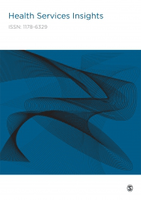
Health Services Insights
Unlocking the future of public health delivery.Health Services Insights is a prestigious, open-access journal published by SAGE Publications Inc. Based in the United Kingdom, this journal has become a vital resource for researchers and professionals in the fields of Health Policy and Public Health. Since its inception in 2008, Health Services Insights has consistently aimed to disseminate high-quality, peer-reviewed research that informs practice and policy in health service delivery and management. With an impressive Q1 ranking in both its categories as of 2023, and a respectable Scopus ranking positioning it within the upper percentiles of its fields, the journal continues to attract influential contributions from global experts. Its open-access format, established in 2013, ensures that vital insights on health services are accessible to all, facilitating knowledge sharing and collaboration among researchers, practitioners, and students alike. By focusing on impactful research and innovation, Health Services Insights plays a crucial role in addressing contemporary challenges in health services and improving health outcomes worldwide.

Zeitschrift fur Evidenz Fortbildung und Qualitaet im Gesundheitswesen
Inspiring change through rigorous research and quality standards.Zeitschrift für Evidenz Fortbildung und Qualität im Gesundheitswesen, published by Elsevier GmbH, serves as a pivotal platform for the dissemination of research and innovations within the realms of health policy, medicine, and education. Established in 2008 and continuing its impactful trajectory through 2024, this journal boasts a recognition as a Q2 journal in Education and positions itself within the Q3 tier for both Health Policy and miscellaneous Medicine categories, reflecting its dual focus on scholarly rigor and practical application. Despite not being an Open Access journal, it remains a valued resource for academics and practitioners, evidenced by its rankings: #214 out of 398 in Medicine (miscellaneous) and #829 out of 1543 in Social Sciences (Education) according to Scopus metrics. The journal's commitment to enhancing education and quality in healthcare makes it an essential read for researchers, professionals, and students seeking to stay abreast of the latest evidence-based practices and policies that shape health outcomes worldwide.
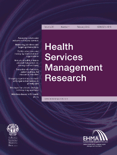
Health Services Management Research
Advancing the Future of Health Policy ManagementHealth Services Management Research is a premier academic journal published by SAGE PUBLICATIONS LTD, focusing on critical areas within the health policy domain. With an ISSN of 0951-4848 and E-ISSN 1758-1044, this UK-based journal has been a valuable resource for over three decades, converging from 1988 to 2024. Recognized for its contribution to the field, it holds a commendable Q2 quartile ranking, positioning it in the top 35% of journals in Health Policy, reflecting its significant impact within the academic community, as evidenced by its rank of 109 out of 310 in Scopus rankings, placing it in the 65th percentile. The journal aims to foster innovative research that addresses the complexities of health services management, making it an indispensable resource for researchers, professionals, and students dedicated to improving health systems. Although it currently does not offer Open Access, the journal remains committed to advancing knowledge and practice in health policy management through rigorous peer-reviewed articles, case studies, and evidence-based analyses.